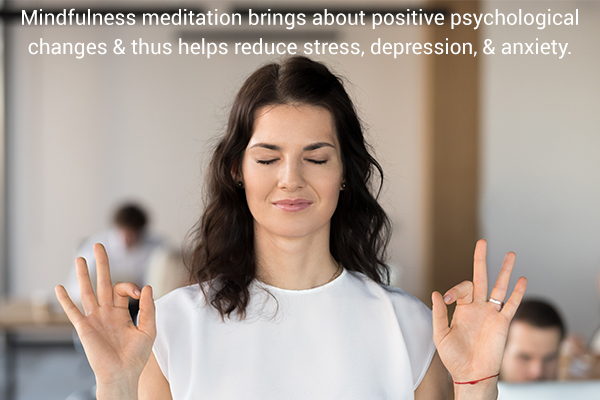In this article:
If you’ve ever wondered how to get out of a mental rut, change the way you think, increase your memory, concentrate, or have more positive emotions. It may be easier than you think!

Studies reveal that meditation and mindfulness meditation, specifically, can change the brain in powerful ways. (1) Practicing even small moments of mindfulness meditation regularly can increase your ability to manage difficult emotions and improve your learning ability. (1)
The Idea Behind Mindfulness Meditation
Sometimes, the word mindfulness creates confusion. Are you supposed to focus on a single thing or clear your mind? Mindfulness means fully attending to what’s happening and what you’re doing in the present moment, non-judgmentally.
It means purposely paying attention and being fully aware of what is happening both inside yourself (physically and mentally) and outside yourself, in your environment.
Purposely paying attention may sound simple, yet it’s natural for people to become easily distracted. Your mind tends to wander, and you begin thinking or fixating on other things, causing you to lose touch with the present moment. Mindfulness also means having this awareness without judgment or criticism.
Does Meditation Reduce Stress and Depression?

Yes. Mindfulness meditation brings about positive psychological changes and thus helps reduce stress, depression, and anxiety. (2)
People with anxiety often get distracted with overpowering thoughts, unable to differentiate between a problem-solving thought and unnecessary worry.
Mindfulness meditation can help a person concentrate on the present situation and lowers lactate levels in the blood, thus preventing anxiety attacks. (3)
Benefits of Mindfulness Meditation
When you practice mindfulness meditation, you create more space from your thoughts and increase present moment awareness. As this happens, you become less reactive.
A benefit to this shift in awareness is a stronger connection to your inner wisdom that guides you to make choices that bring about a better balance in your life. When you are out of balance, illness and disease can occur more easily. Therefore, practicing mindfulness helps to keep your body and mind in a better balance. (4)
The common benefits of mindfulness meditation to the body and mind include:
- Reduced stress and anxiety
- Lowered blood pressure
- Improved heart health
- Better cognitive function
- No insomnia
- Delayed brain aging
- Better immunity (3)
- Improved mood
- Prevention of genetic damage
- More energy
Meditation for Insomnia Relief

Meditation can help fight insomnia as it helps increase sleep duration, improves the ability to fall and stay asleep, and aids in overall sleep quality. (5)
Practicing meditation reduces the arousal signals in the brain, thus helping you sleep. Also, meditation has no side effects or associated risks, and it can be safely tried. Therefore, meditation is an easily accessible and cost-friendly practice that can help treat insomnia in people of all ages. (5)
Meditation for Managing Common Medical Conditions
Regularly practicing meditation has a positive impact on your mental, physical, and spiritual health.
Meditation thus helps your overall health, including improving various health conditions such as diabetes, high blood pressure, (3) and irritable bowel syndrome (IBS).
It also helps decrease the intensity and frequency of tension-related pains, such as ulcers, headache, insomnia, muscle pain, or joint pain.
Does Meditation Prevent Genetic Damage?
The effects of meditation are not limited to the mind but penetrate deep into the brain stricture and functioning of genes.
It has been observed that around 172 genes in people who meditated regularly for 8 weeks had a change in expression. These genes were involved in the regulation of blood pressure, inflammation, glucose metabolism, and circadian rhythms. (6)
This wide range of molecular and genetic differences also enables faster recovery from a stressful situation. (7)
Meditation Is Good for Your Immunity

The immune system interacts with the brain through chemical messengers in the blood. A weakened immune system increases the risk of infection and disease.
Meditation has immunomodulatory impacts on your body. It influences various immune cells and their response to pathogens. Meditation also helps reduce inflammation levels and thus decreases the burden on your immune system. (8)(9)
Mindfulness Meditation is Like Taking Your Brain to the Gym for a Workout
The regular practice of mindfulness meditation appears to strengthen the brain and enhance connections in several regions of the brain. (10) So, your brain can be strengthened like a muscle.
Here are four key ways mindfulness meditation changes your brain:
- It reduces activity in the amygdala, a region of the brain known as the “fight or flight” center that regulates how much stress you experience and your emotional response to fear. (11)
- The amygdala also decreases in size, resulting in a reduction in stress levels. (11)
- Regular practice of mindfulness meditation increases the density of gray matter in the brain, improving brain connectivity in areas that affect memory, self-awareness, and compassion. (12)
- As you practice meditation, the prefrontal cortex is strengthened, resulting in more processing power for concentration and better decision making. (13)
Practicing Mindfulness Meditation
Thankfully, you don’t need to spend several hours a day, silently meditating to change your brain. The key is a regular (daily) practice, such as:
- Doing breath awareness meditation
- Performing mindful stretches (such as yoga)
- Taking a meditative nature walk
The brain benefits come from consistency of practice, so make this a daily ritual, a designated time for self-care, even if it is just 10 minutes each day.
The Best Way to Practice Meditation

Try this breathing meditation:
- Sit in a comfortable position or lie on your bed or another comfortable place.
- Relax your shoulders, and then close your eyes to help you focus on your breath.
- Breathe in slowly through your nose, and then exhale slowly through your nose or softly through your mouth.
- Put one hand on your chest and the other hand on your stomach.
- Gradually deepen your breath and focus on the flow of your breath in and out slowly until you feel your stomach expand or rise (as you inhale) and fall inward (as you exhale). This belly movement should feel more dramatic than your chest movement, which remains more still.
- After you get the hang of this, if you’d like, you can then focus on the word “peace” as you inhale (and the belly expands) and the word “relax” as you exhale (and the belly falls inward).
Practice this breathing meditation for 5–10 minutes, 1–2 times per day.
Origins of Mindfulness
Mindfulness has originated from the Buddhist concept of sati, which preaches present moment awareness. (14)
Jon Kabat-Zinn played a major role in bringing mindfulness from east to the west. (15) He developed a mindfulness-based stress reduction (MBSR) program that aims at reducing stress levels in people.
Mindfulness meditation has now become a popular practice to lower stress and increase emotional well-being. Its effects on brain health and cognition are being researched.
Helpful Tips
- Lie on your back with knees bent to make the practice easier.
- Start with 5–10 minutes of practice, and then gradually increase the amount of time.
- Make it a habit by practicing once or twice a day, at the same time, to help create a routine.
Final Word
Mindfulness meditation is a method of training your brain to hold onto a thought spatially. Meditation helps remove negative feelings and reduces anger, stress, worry, and doubt. Practicing mindfulness meditation helps improve your mental, physical, and spiritual well-being.
- Was this article helpful?
- YES, THANKS!NOT REALLY


